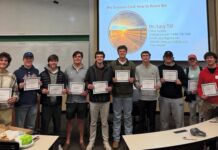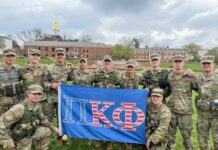 The Cloverhurst Benevolent Foundation was born from the early stages of social media. Hard to believe that a Harvard dropout’s creation would greatly impact the lives of University of Georgia Fiji grads – but it would.
The Cloverhurst Benevolent Foundation was born from the early stages of social media. Hard to believe that a Harvard dropout’s creation would greatly impact the lives of University of Georgia Fiji grads – but it would.
After graduating from the University of Georgia in 1979, I left Athens for medical school, residency, marriage, and a family. After a stint in New Orleans, I returned to settle permanently in Atlanta. For about 30 years, I had little contact with any Phi Gamma Delta fraternity brothers. Then Facebook was born. Reluctantly, and not really understanding why, I created a page. I am glad I did.
Amazingly, people whom I had not thought of since my 20s began to “friend” me. From this, Fiji grads began to push me to attend Pig Dinner – my last having been as a senior undergrad. Semi-reluctantly, I agreed to go. Riding with me was a brother who had been a year or two behind me in the Chapter. We were not close, but I remembered him fondly as a tall kid with a dry wit and a schlock of thick blonde hair. He told me he no longer had a driver’s license and needed a ride. He said he would explain on our trip to Pig Dinner.
When I pulled up to his house, the tall kid with thick blonde hair had been replaced by a bald, overweight, middle-aged man. He had warned me I might not recognize him. I didn’t.
On our 1 1/2-hour ride to Athens, he told a story I never expected to hear from a Georgia Fiji. He had been homeless, only recently putting his life back together and getting a place to live. I assumed he meant “homeless” in the sense of losing his house in a divorce or from fire or storm, but that was not the case. He meant “homeless” in the literal sense. I was stunned at this information and also at his candor. After college, he got his MBA, was doing well in business, married with children, but started drinking heavily at business outings. The heavy social drinking lead to alcoholism. He eventually lost his job and his marriage, only to find himself on the street. It was hard to grasp that he did not have family or friends to fall back on for help, but he didn’t. And yet here we were, on our way to a graduate dinner with a fraternity that always stressed “not for college days alone.”
Certainly, I thought, if he had reached out to his fraternity brothers for help, someone would have been able to assist.
But the reality was there was no formal support system for graduate brothers with severe problems and no other support.
Later that evening, at my first Pig Dinner as a graduate brother, I learned of about a dozen brothers who had died young from suicide, alcoholism or drug abuse. This was alarming, given that, by any objective standard, we were a superior chapter. During my four years, we won the Cheney Cup twice, maintained the highest GPA among fraternities, were twice named fraternity of the year, won the fraternity athletic trophy twice, and more accolades. This was a group of smart, talented, hard working young men, who still produced graduates who developed life-ending problems.
A group of us discussed these events and decided to create an organization that could help graduate brothers with addiction, alcoholism, depression or financial problems who had fallen through the cracks and had no support system.
For various reasons, the initial plans fell to the way side, and we never formed the organization.
A few years later, several of us learned of a Fiji contemporary who was an alcoholic, had other addiction, was in financial trouble, and had lost his marriage. Shades of the initial story. This time, however, four brothers decided he would not fall by the way side and end up on the street or dead. We had an “intervention” and got this brother into rehab.
With that experience as motivation, we finally formed the Cloverhurst Benevolent Foundation.
We are now about six months post formation, with a 501(c)3 charitable status and website
www.cloverhurst.org. Our financial goal is to endow the Foundation with $100,000.00. We are well on our way. The Foundation provides support to Georgia Fiji graduates with alcoholism, addiction, financial and other problems who have no means of support.
We provide support other than just financial. In the recent case, post rehab the Foundation board met weekly with the brother for eight weeks to help get him back on his feet. In addition to his alcoholism, he had other addictive and financial problems. Immediately we found him a job. We reviewed his financial situation in detail and helped set up a plan to correct these problems. We provided financial aid. We helped him understand how these problems occurred. We hired and paid for an attorney to assist with his legal problems.
Six months after rehab, our brother is sober, has lost 60 pounds, has corrected some medical problems caused by his addiction, and has regular work with a tremendous upside.
We learned a lot from this first “intake” and are spreading the word so that other graduate brothers in need will reach out to us for assistance.
We would love to see this model adopted by graduates of other chapters and would be happy to assist any interested brothers. Foremost, we want to spread the word to UGA Fijis that this foundation exists as a support system for those with financial, alcoholism, addiction, depression or other problems.
“Not for college days alone” should not just be for social and business purposes. It should also mean that your fraternity is there when you have no other source of support.






















